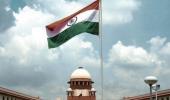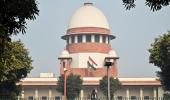A two-judge bench of the Supreme Court on Wednesday pronounced a split verdict on the Centre's plea for recall of its October 9 order granting permission to a married woman, a mother of two, to terminate her 26-week pregnancy, with one judge voicing her disinclination to allow abortion and the other asserting that the woman's decision "must be respected".
 While Justice Hima Kohli wondered which court will say "stop the heartbeat of a foetus" and made it clear she was not inclined to permit the 27-year-old woman to terminate her pregnancy, Justice B V Nagarathna said the court should respect the decision of the woman who has remained determined to abort it.
While Justice Hima Kohli wondered which court will say "stop the heartbeat of a foetus" and made it clear she was not inclined to permit the 27-year-old woman to terminate her pregnancy, Justice B V Nagarathna said the court should respect the decision of the woman who has remained determined to abort it.
In view of the disagreement between them, the two judges of the bench, which had passed the October 9 order, decided to place the Centre's application before Chief Justice D Y Chandrachud for being marked to an appropriate bench for adjudication.
Justice Kohli observed that the top court had permitted the woman to terminate her pregnancy after considering the October 6 report submitted by a medical board of the All India Institute of Medical Sciences (AIIMS).
During the hearing, the bench took exception to an October 10 e-mail addressed by one of the members of the medical board about the strong possibility of survival of the foetus, and asked which court will say "stop the foetal heartbeat".
"If the doctor could be so candid in two days short of the earlier report, why was not the (earlier) report more elaborate and more candid?” the bench asked, adding, "Why were they being ambiguous in the earlier report?"
Justice Kohli wondered which court would say stop the heartbeat of a foetus which has life. "Speaking for myself, I would not," she said.
In her order, Justice Kohli noted the application filed by the Centre seeking recall of the order was premised on the e-mail dated October 10.
The bench said it was "rather unfortunate" that the e-mail was addressed the very next day of the order being passed.
It said what has been stated in the e-mail ought to have been mentioned in the October 6 report of the medical board so the court could have a "correct and clearer perspective" of the matter.
"The report itself was fairly ambiguous on aspects which are now sought to be elucidated," Justice Kohli said.
She noted when the matter was taken up for hearing in the morning session, the bench had asked the petitioner woman to file an affidavit clarifying her stand in the wake of the e-mail.
Justice Kohli said the woman filed her affidavit stating she has made a "wilful and conscious decision" to medically terminate her pregnancy.
"Having regard to the information contained in the e-mail dated October 10, 2023, addressed by a professor of AIIMS, one of us is not inclined to permit the petitioner to terminate her pregnancy," she said, adding, "My sister judge (Justice Nagarathna) is of a different opinion."
Justice Nagarathna said she respectfully disagrees with Justice Kohli.
Justice Nagarathna observed that the woman's plea was disposed of by the court by a detailed order on October 9 and the petitioner has remained determined about her decision to not proceed ahead with her pregnancy.
"Having regard to the concrete determination made by the petitioner, I find that her (woman) decision must be respected. This is not a case where the question of viable baby being born or unborn is to be really considered when the interest of petitioner has to be given more balance and preference," she said.
Referring to the socio-economic condition of the petitioner, the fact that she already has two children and has reiterated that her mental condition and medicines which she is taking do not permit her to continue with the pregnancy, "I find that her decision must be respected by the court."
"In these circumstances, I find that the order dated October 9, which is a well-considered order authored by my sister Justice Hima Kohli, does not require any recall," Justice Nagarathna said while dismissing the Centre's application.
During the hearing, Additional Solicitor General Aishwarya Bhati, appearing for the Centre, referred to the medical opinion which has now come in the matter.
"Once there is a viable baby on the other side, my respectful submission would be that your lordships may not give absolute primacy to her choice and her autonomy of exercising her reproductive rights," she said.
During the hearing, the bench said it does not appreciate the way the Centre had mentioned the matter on Tuesday before a bench headed by the CJI.
"When one bench of this court decides a matter, without any pleadings whatsoever, how can you move an intra-court appeal before a three-judge bench of this court," Justice Nagarathna said.
"If the Union of India starts doing this, tomorrow a private party will also do this," she said, adding, "Every bench of the Supreme Court is Supreme Court. We are one court sitting in separate benches. Speaking for myself, I would not appreciate this on the part of Union of India."
Bhati explained to the bench the circumstances leading to mentioning of the matter on Tuesday before the CJI-led bench.
The apex court had on Monday allowed the woman to proceed with aborting the foetus after taking note that she was suffering from depression and was not in a position to raise a third child "emotionally, financially and mentally".
On Tuesday, a bench headed by the CJI had directed AIIMS, Delhi, to defer the termination of the woman's pregnancy after Bhati said abortion was recommended despite the medical board saying the foetus had a viable chance of being born and "they would have to conduct a foeticide".
The woman had moved the apex court seeking its approval to terminate her pregnancy citing medical grounds, including that she was suffering from postpartum depression.
Under the Medical Termination of Pregnancy (MTP) Act, the upper limit for the termination of pregnancy is 24 weeks for married women, special categories including survivors of rape, and other vulnerable women such as the differently-abled and minors.











 © 2025
© 2025